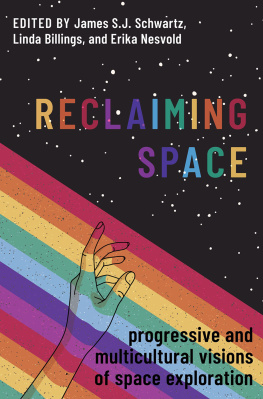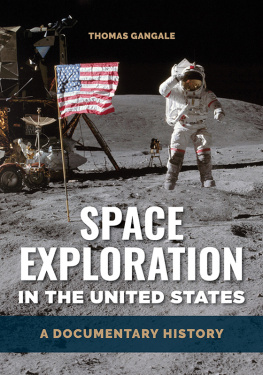Reclaiming Space

Oxford University Press is a department of the University of Oxford. It furthers the Universitys objective of excellence in research, scholarship, and education by publishing worldwide. Oxford is a registered trade mark of Oxford University Press in the UK and certain other countries.
Published in the United States of America by Oxford University Press
198 Madison Avenue, New York, NY 10016, United States of America.
Oxford University Press 2023
All rights reserved. No part of this publication may be reproduced, stored in a retrieval system, or transmitted, in any form or by any means, without the prior permission in writing of Oxford University Press, or as expressly permitted by law, by license, or under terms agreed with the appropriate reproduction rights organization. Inquiries concerning reproduction outside the scope of the above should be sent to the Rights Department, Oxford University Press, at the address above.
You must not circulate this work in any other form and you must impose this same condition on any acquirer.
CIP data is on file at the Library of Congress
ISBN 9780197604793
eISBN 9780197604816
DOI: 10.1093/oso/9780197604793.001.0001
For the dispossessedof this planet, and of the stars
Contents
James S. J. Schwartz, Linda Billings, and Erika Nesvold
Linda Billings
Mukesh Chiman Bhatt
Edward C. Davis IV
Alan Marshall
William Lempert
Mary Robinette Kowal
Vandana Singh
Danielle Wood, Prathima Muniyappa, and David Colby Reed
Saskia Vermeylen and Jacque Njeri
Daniela de Paulis and Chelsea Haramia
James S. J. Schwartz
Ingrid LaFleur
Deana Weibel
Tony Milligan
Daniel Capper
Kathryn Denning
Alice Gorman
Sheri Wells-Jensen
Erika Nesvold
Ruvimbo Samanga
Tanja Masson-Zwaan
William R. Kramer
Evie Kendal
Janet de Vigne
Octavio Chon-Torres
Andrea Owe
Francesca Ferrando
Lori Garver
Humanitys first steps beyond Earths atmosphere were to essentially advance military objectives. The National Aeronautics and Space Administration (NASA) was established in 1958 for expressed peaceful purposes but was in reality an instrument of the Cold War. The premise put forward in my memoir, Escaping Gravity, is that while this linkage increased NASAs budget immensely, it also drove the fledgling space agencys culture toward episodic large engineering projects and away from investments in scientific research and technical innovation that could have returned more broad societal benefits. In turn, this focus attracted a workforce most interested in conducting daring exploits for a few White men, and the massive scale of such endeavors could only be conducted by the worlds two superpowers of the time, the United States and the Soviet Union.
Remembrances of Apollo focus on the bold, daring dreams of a young President and romanticize the era and purpose of the mission. We choose to go to the Moon in this decade and do the other things, not because they are easy, but because they are hard is a justification still repeated in an attempt to increase NASAs funding today. Rarely acknowledged are the recordings of Kennedy telling NASA Administrator James Webb in November 1962 that if we cant beat the Russians, we ought to be clear, otherwise we shouldnt be spending this amount of money, because Im not that interested in space. The historic record is clear, but still this narrative prevails, reinforced by historians and institutions committed to perpetuating the legend. Mythology sells.
Nostalgia for the early manned space program depicts it as a period that was thrilling and wonderful for everyone. In reality, that was primarily the case for Anglo-Saxon Caucasian men in the United States. NASAs overwhelming early success narrowed its field of vision and prevented the US space program from being oriented towards more fundamental and inclusive goals. By putting these past achievements on a pedestal, we limited our future. The massive institutional bureaucracy and industry interests developed for Apollo required exorbitant fixed costs just to be maintained, and once in place, legacy interests were naturally conditioned to seek similar missions and goals that could use the same infrastructure and workforce.
The space community has been frustrated by a lack of US government investment in space exploration but hasnt wanted to accept the fundamental source of the problem. Too many stakeholders are invested and incentivized to protect the current way of doing business. Apollos mandate was unique, but because of its success, it set a culture ill-suited to carry the hopes and dreams of the global citizenry.
Space endeavors can contribute to the greater good by connecting the world and reaching beyond, but fundamentally, we still have a system that creates programs to suit its own needsdoing the things the people who already work there want to doinstead of creating programs that address the publics needs. Public polls on space issues consistently rank studying Earth Science and detecting asteroids as the top two priorities for space exploration, while sending a few humans to walk on the Moon and Mars rank at the bottom of the list. Aligning space exploration programs to address todays challenges would expand interest and talent beyond its existing narrow constituency and encourage a more diverse workforce. An important justification for human spaceflight is its ability to inspire. Instead of trying to refuel a Cold War hysteria, we should be designing missions to inspire those we have yet to reach.
In reality, there are as many motivations to advance space development as there are people on the planet. That is the point. Instead of benefiting a few, space should be fully utilized to benefit humanity and society. Future space activities can help us not only to thrive, but also to survive.
Space is a transformative location with unique characteristicslike Earths own atmosphere and oceans. Earlier societal expansions that exploited the oceans and the atmosphere grew to support vastly different uses, including transportation, communications, scientific research, recreation, and warfare. Early explorers who learned to operate in these otherwise hostile, alien environments, carried their own cultural bias, and foreignsometimes deadlybiology.
Societys expansion and exploitation of space are evolving to support similarly diverse uses. Early successes in human spaceflight enhanced prestige and reinforced the intent for global space dominance by competing spacefaring nations. Advancing technologies and reducing barriers to entry for space exploration now require us to evaluate and adjust our intentions. As capabilities and industries mature, government regulations related to public safety, environmental stewardship, and shared resources must also evolve.
Exploring space has allowed us to begin to understand the mysteries of the universe, including how life began and whether it exists elsewhere in any form. Space missions have opened our eyes to what lies beyond our atmosphere, as well as on the Earth below. Operating in space provides us instantaneous global delivery of voice, data, and video information; precision measurement of time and location; and Earth observations that measure the interactions between the atmosphere, land, ice, and oceans that affect us all.









